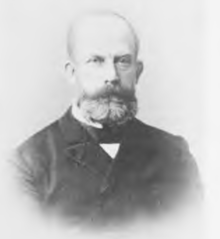Peter Friedrich Ludwig von Rössing
Peter Friedrich Ludwig von Rössing also Peter Friedrich Ludwig Freiherr von Rössing (born February 4, 1805 in Oldenburg ; † June 23, 1874 there ) was a German administrative lawyer and from 1872 to 1874 Oldenburg Minister of State .
biography
Rössing was the son of the bailiff in Cloppenburg Ernst Conrad Christian von Rössing (1762-1827) and grandson of the budget council of Ovelgönne August Friedrich Ludwig von Rössing. He came from a well-known Lower Saxon nobility and civil servant family and also started a civil service career. After private lessons and attending grammar schools in Osnabrück and Oldenburg , he studied law in Göttingen from 1825 to 1828 . After graduating in 1834, he was employed as an auditor at various offices in the Grand Duchy of Oldenburg. From 1836 he worked as an assessor at the Ovelgönne district court and from 1839 at the Vechta district court . From 1838 he also held the court office of chamberlain . In 1843 he became assessor at the judicial office and in 1846 he was appointed chamberlain . In 1848 he became a member of the Military Court and the Military College and received the title of High Court Council. After the resignation of Minister Dietrich von Buttel , he was appointed to the State Council at the beginning of 1851 , then a member and, in August 1851, finally to the Board of Directors of the State Ministry. With this office he took over the departments of justice as well as the churches and schools. Moreover Rössing at the same time also took over the department with the Royal House and Foreign Affairs and initially representatively for by Frankfurt as a parliamentary envoy seconded Minister Eisendecher . This was released from his ministerial offices in February 1852 and Rössing officially followed him in these offices. After being awarded the title of Minister in January 1854 and Minister of State in 1872, he died after a brief illness on June 23, 1874.
Significance and political impact
During Rössing's tenure as minister, decisive changes took place in the field of domestic and foreign policy , in which he played a key role. As a reaction to the suppressed revolutionary efforts of 1848/49, a revision in the conservative sense was made to the state constitution of 1849 . In 1853 the church constitution was reorganized and in 1855 the teaching and education system was reorganized. In the judicial sector, a new court constitution, laws on civil process, a code of criminal procedure , a code of law, a penal code (1857/1858) and regulations on matrimonial property law and inheritance law (1873) were passed for the Grand Duchy . The question of the Oldenburg succession law in the duchies of Schleswig and Holstein was resolved in Rössing's tenure in February 1867 with the Treaty of Kiel . Rössing made possible by a compromise with Prussia the Grand Duke Peter II. To save face and prevented his resignation. In January and February 1867 he took part in the ministerial conferences in Berlin , in which the constitution of the North German Confederation was discussed. There he found no hearing for the Oldenburg requests for changes and additions, which had previously been discussed in long meetings of the State Ministry. Nevertheless, he ultimately campaigned for the Federal Constitution to be adopted by Oldenburg, which led to the Grand Duke being upset.
family
Rössing was married to Emma Wilhelmine (March 16, 1822 - December 5, 1852), the daughter of the Oldenburg Oberhofmarschall Friedrich Franz Graf von Münnich (1788-1870), from 1846 . After the death of his wife, he married her widowed sister Adelheid (November 2, 1819 - November 11, 1889) in 1856, who had previously been married to Rössing's brother, the Oldenburg Chamberlain and Landjägermeister Hermann Freiherr von Rössing (1797–1855).
Of his children, Hermann (1858–1932) officiated as Oldenburg Chamberlain and Castle Captain. His daughter Marie (1849-1936) was married to August von Frydag on Daren.
After the death of his brother, the Hanoverian State Minister August von Rössing (1799-1870), Rössing also held the office of hereditary land marshal of the Principality of Halberstadt , where Rössing's great-grandfather worked as a lieutenant engineer before he came to Jever .
literature
- Peter Friedrich Ludwig Freiherr von Rössing. In: Hans Friedl u. a. (Ed.): Biographical manual for the history of the state of Oldenburg . Edited on behalf of the Oldenburg landscape. Isensee, Oldenburg 1992, ISBN 3-89442-135-5 , pp. 620-621 ( online ).
- August Mutzenbecher: Rössing, Peter Friedrich Ludwig Freiherr von . In: Allgemeine Deutsche Biographie (ADB). Volume 29, Duncker & Humblot, Leipzig 1889, p. 262 f.
- Gothaisches genealogical pocket book of the baronial houses for the year 1873. Third and twentieth year. P.567
| personal data | |
|---|---|
| SURNAME | Rössing, Peter Friedrich Ludwig von |
| ALTERNATIVE NAMES | Rössing, Peter Friedrich Ludwig Freiherr von (full name) |
| BRIEF DESCRIPTION | German administrative lawyer and Oldenburg Minister of State (1872–1874) |
| DATE OF BIRTH | February 4, 1805 |
| PLACE OF BIRTH | Oldenburg |
| DATE OF DEATH | June 23, 1874 |
| Place of death | Oldenburg |

